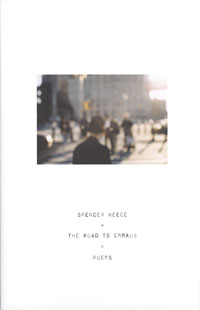Griffin Poetry Prize 2015
International Shortlist
Book: The Road to Emmaus
Poet: Spencer Reece
Publisher: Farrar, Straus and Giroux

Biography
Spencer Reece is a poet and priest. His first collection, The Clerk’s Tale, won the Bakeless Prize in 2003. He has received an NEA grant, a Guggenheim grant, a Witter Bynner Prize from the Library Congress, a Whiting Writers’ Award, and the Amy Lowell Travelling Scholarship. His poems have been published in The New Yorker, Poetry, The American Scholar, and The New Republic. He served at the Honduran orphanage Our Little Roses, and works for the Bishop of Spain for the Reformed Episcopal Church, Iglesia Española Reformada Episcopal.
Judges’ Citation
“This is an open book, a welcoming one like a voice on the phone we instantly remember. Maybe Frank O’Hara has returned? Maybe the Berrigans, including Ted? What happiness to hear that good-natured tone again! Spencer Reece has slipped in among us, without any forewarning or embarrassment, his poems like faces turning to call us to follow them. Who is he? Let’s go. Whether he knew it or not, the experience of reading his poems is similar to the recognition moment on the road to Emmaus. We are glad to trust so completely. In these poems we also meet a kind of ‘innocent American’ in the best, almost lost sense.”
Summary
Reece’s central figure in The Road to Emmaus is a middle-aged man who becomes a priest in the Episcopal Church; these poems follow him to New York City, to Honduras, to a hospital where he works as a chaplain, to a prison, to an Alcoholics Anonymous meeting. A yearning for connection, an ache of loneliness and the instant of love disappearing before our eyes haunt this long-awaited second collection from Spencer Reece.
Note: Summaries are taken from promotional materials supplied by the publisher, unless otherwise noted.
Spencer Reece reads from The Upper Room
from The Upper Room
For Mary Jane Zapp
If you looked up, you might have seen me,
although few saw me in that room:
it required crossing the threshold
from the profane to the sacred,
a paradoxical proposition for most, including myself.
But I went in search of the transcendent in those days,
which required leaving a particular world for another.
It is never easy to abandon a world.
It was my second attempt.
This time I was much older
and the strident faiths of my younger colleagues
often gave me pause.I lived on the third floor on 363 Ronan Street.
By that time in my life I recognized the room was temporary –
from the start, I accepted the dwelling’s transitory nature.
Each November, between shut gray New England spaces,
I saw nervous birds, those itinerant immigrants,
abandon the trees; addicts of seeing,
they charged the horizon when color was removed.
I pressed against the window
as if it were a museum case,
just as the world pressed against the windows of New Haven,
examining each one of us like a relic with a label,
in the same inquisitive, cursory manner.
The skyline was muted, ill-defined:
New Haven sprawled from Gothic elegance
to poverty without drama.
The landscape was obstructed:
we were deaf to the sea’s plainchant, could not smell its stink,
taste its salt, the harbor blocked by a highway and warehouses.From The Road to Emmaus by Spencer Reece
Copyright © Spencer Reece 2014
More about Spencer Reece
The following are links to other Web sites with information about poet Spencer Reece. (Note: All links to external Web sites open in a new browser window.)
- Spencer Reece (Poetry Foundation)
- Questions of Faith: Spencer Reece (Poetry Society of America)
- Post-40 Bloomer: Spencer Reece, The Poet’s Tale (The Millions)
Have you read The Road to Emmaus by Spencer Reece? Add your comments to this page and let us know what you think.
Photo credit: Rosanne Olson
